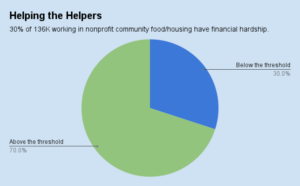Gleaners Food Bank of Indiana has joined the growing number of food banks that are lifting pay, ensuring everyone in the organization is earning a living wage.
Gleaners announced in May that it has been certified as providing a minimum starting wage of at least $18 an hour, the designated living minimum wage in Indianapolis, as well as health insurance to all its employees. EmployIndy, a local organization that seeks to promote equity in the workforce, awarded the certification, naming Gleaners a “Good Wages Initiative” employer.
The recognition comes as a growing number of food banks are scrutinizing their own internal practices. As Food Bank News wrote about last May, more food banks are addressing their own employment policies as they seek to do their part in overcoming societal inequities like low wages that cause food insecurity in the first place.
“We’re here to shorten the line, so we ought not be adding to the line,” said Fred Glass, who came on as President and CEO of Gleaners last September.
Raising wages emerged as a straightforward move, as Glass set about clarifying Gleaners’ purpose, mission and values upon his arrival at the food bank last fall. One of his goals was to create a more unified employee experience, mimicking a similar effort he had undertaken during his 11 years as the athletic director at Indiana University.

At Indiana, Glass sought to unify the university’s 24 different sports under the brand, “24 Sports One Team.” At Gleaners, the motto “One Gleaners” has similarly worked to break down silos between different parts of the organization. Silos can be particularly pervasive in food banking, Glass noted, because of the natural barriers between the warehouse jobs and the inside desk jobs. “One of the things I really want to do is break through that,” he said.
Instituting living wages is a fundamental part of One Gleaners, Glass said. And it extends to other wage-related policies. For example, Gleaners employees previously earned paid time off at different rates, with higher-paid workers acquiring PTO more quickly than their lower-paid counterparts. They also were eligible for higher amounts in their holiday gift cards. “That didn’t feel very One Gleaners to me, so now we do all of that in a uniform way,” Glass said.
One Gleaners also encompasses activities unrelated to wages. Every other month, the food bank holds a “Lunch and Learn,” where a representative of a certain area, say cold storage, presents to the entire organization, helping to foster greater understanding of how the entire food bank works. There are also town halls where employees can ask anything of Glass, as well as regular get-togethers to recognize birthdays and service anniversaries. “Especially in this remote world, we’re trying to give people a reason to come in, come together and have fellowship and talk about their kids,” Glass said.
When Glass shifted into non-profit work from the for-profit world, which included several years as a law firm partner, he felt it was important to demonstrate his belief in the mission. For that reason, he eschewed having an employment agreement upon his arrival at Gleaners. “I think I’m the first CEO in the history of the food bank not to have an employment agreement because I didn’t want one,” Glass said. “I want to sit across the table and say, ‘I’ve got to please my boss to stay around,’ not because I’m too expensive to fire because I’ve got a five-year contract.” That move has resonated with employees more than he thought it would, Glass said.
Aside from fostering a more equitable work environment, Glass expects that One Gleaners and the move toward living wages will help the food bank retain employees in what is a very competitive work environment. Known as the Crossroads of America due to its location at the juncture of four major highways, Indiana offers a multitude of competing warehouse and logistics jobs. “It helps us to have that baseline,” Glass said.
Glass gave credit to his predecessor, John Elliot, for initiating the living wages project. He estimated that EmployIndy has so far certified about 60 employers in the region. “I think people are really proud to be part of an organization that is taking care of its own people,” he said. – Chris Costanzo
Like what you’re reading?
Support Food Bank News









